I Wake Up Streaming: September 2020
Movies
In this edition of “I Wake Up Streaming,” novelist William Boyle rounds up his top streaming picks for the month of September. The column’s name is a play on the 1941 film I Wake Up Screaming, starring Betty Grable, Victor Mature, and Carole Landis. While the film’s title hits a pleasing note of terror and despair, changing that one letter speaks to the joy of discovering new films and rediscovering old favorites, as well as the panic that comes with being overwhelmed by options.
I’ve always leaned hard on movies in times of grief, during long bouts of depression and anxiety and uncertainty. The collective anguish we’ve all been feeling the last six months—the virus, the boiling-over injustice, the systemic corruption and greed, the disastrous fallout from this nightmare administration, so many great artists lost, a perfect storm of horror shows—has only made me dig in deeper. I go to movies for comfort but also for answers. When I heard that Chadwick Boseman had passed away, I turned to his work. Was it the pain, the struggle, which made his performances so human? It’s easy to look now at what he did over the last several years and think that every decision he made as an actor, every glance, every line delivery, is haunted by the specter of death. The first film of his I rewatched this past week was Get on Up, the James Brown biopic from 2014 that mostly received middling reviews. It isn’t great—and it’s hard not to think about what it would’ve been with Ryan Coogler or Spike Lee at the helm, instead of Tate Taylor, director of The Help—but Boseman is just incredible as Brown. It’s currently streaming on HBO Max, and—while I’m not generally a fan of biopics—Boseman’s ethereal performance is enough to fully recommend it. While his work in Black Panther, Marshall, and 42 is rightfully celebrated, it’s easy to sleep on his complex portrait of a complex figure like Brown. Boseman’s also ethereal—downright angelic—in one of my favorite films of 2020, Spike Lee’s Da 5 Bloods, available on Netflix. The way Lee and cinematographer Newton Thomas Sigel shoot him is magical. Though Delroy Lindo steals the movie, Boseman is its beating heart. What an artist. What a loss.
While Turner Classic Movies isn’t technically a streaming service (they do have an app where you can access the previous month’s programming with a cable subscription), there’s nothing I’m more excited for in the coming months than their lineup for Women Make Film. So many favorites, as well as films I’m looking forward to seeing for the first time and filmmakers I’m excited to discover. I’m going to highlight some picks below that are part of the September schedule for Women Make Film that are also available to stream on other services.
Merrily We Go to Hell. 1932. Criterion Channel, TCM.
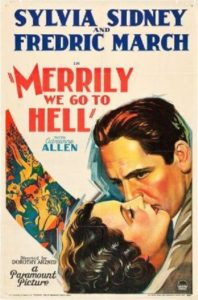
The first film programmed in TCM’s Women Make Film lineup is Dorothy Arzner’s knockout 1932 pre-Code starring Sylvia Sidney and Frederic March. If you don’t have access to TCM, Merrily We Go to Hell is (luckily) also available on the Criterion Channel. The pre-Code era is one of my absolute favorites, and this film is truly indicative of what makes it so sublime and special. Merrily We Go to Hell is an economical melodrama, unafraid to challenge, shock, and shift tones. Arzner’s career spanned 1927–1943. During that time, she was the only female director working in Hollywood. She is also the most prolific woman studio director in the history of Hollywood, a true pioneer. Her career has been undergoing a revival lately (1940’s Dance, Girl, Dance was recently released on Blu-ray by Criterion, and her films have been regularly programmed on the Criterion Channel and, previously, FilmStruck). This is a great place to start with her. The Criterion Channel is also currently featuring another Arzner pre-Code, Working Girls (1931), as well as a documentary on Arzner by Katja Raganelli.
Wanda. 1970. Criterion Channel, Kanopy, TCM.
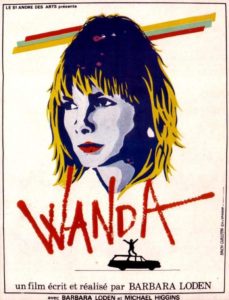
An absolute masterpiece. No movie lingers in my memory more. Like many folks, I saw this film for the first time a few years ago. Previously, I only knew Barbara Loden from her roles in her husband Elia Kazan’s films, Wild River and Splendor in the Grass. Loden poured everything she had into Wanda, writing, directing, and starring as the titular character. Her tragedy was not only that her career was then derailed by the Hollywood machine, as was and still is so often the case for women, but also that was she was diagnosed with breast cancer in 1978 and was dead by the age of forty-eight in 1980. She only made a couple of shorts following this in the ’70s. In a just world, we would’ve gotten at least a few more films from her. The great writer and filmmaker Marguerite Duras wrote: “I think that there is a miracle in Wanda. Usually there is a distance between representation and text, subject and action. Here this distance is completely eradicated.” Wanda is a stark film—gritty, strange, warped, funny—and there’s no slickness to what Loden does. She detested slickness. It’s a masterpiece of tone, a pioneering work. I also highly recommend Nathalie Léger’s wonderful book A Suite for Barbara Loden.
Mikey and Nicky. 1976. Criterion Channel, HBO Max, Tubi, TCM.
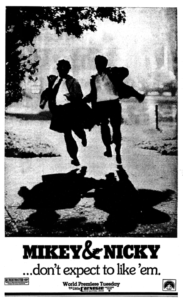
I often cite Elaine May’s Mikey and Nicky as my favorite film. It’s definitely one that’s consistently in my top ten. Every time I sit down to write, I think of Mikey and Nicky (my latest novel, City of Margins, has main characters named Mikey and Nick as an homage). Anchored by brilliant performances from John Cassavetes and Peter Falk, with memorable supporting turns from Ned Beatty and Joyce Van Patten, it is a perfect film made by a true American genius, Elaine May. Though it has the improvisational feel of Cassavetes’s films, it’s tightly scripted and never less than riveting. It’s a compassionate, tender movie. Soulful, harrowing. I often think that I want to write about men the way May writes about men. The other films she directed (A New Leaf, The Heartbreak Kid, and Ishtar) are also damn great, but this is her best, a work that should be mentioned in the same breath as revered ’70s cinematic masterworks like Taxi Driver and A Woman Under the Influence.
Losing Ground. 1982. Criterion Channel, TCM.
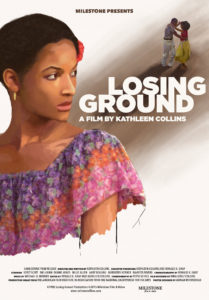
Kathleen Collins, like Barbara Loden, was a genius who had her life cut short by breast cancer. Collins taught film history and screenwriting at CUNY, and she died at age forty-six. She left behind a compelling body of work, infused with her independent spirit. She wrote screenplays, stories, plays, poems, and essays. I definitely recommend getting her books, Whatever Happened to Interracial Love?: Stories and Notes from a Black Woman’s Diary: Selected Works of Kathleen Collins. Her first film, the forty-nine-minute The Cruz Brothers and Miss Malloy, based on a Henry Roth story, was very memorable, but it’s her feature debut, Losing Ground, that has proven to be her most enduring work. Collins was also a pioneer. Losing Ground was the first feature-length drama directed by a Black American woman. Her work paved the way for Julie Dash, Gina Prince-Bythewood, Ava DuVernay, Kasi Lemmons, Dee Rees, and many others. Losing Ground is a quiet and quietly beautiful film. It features gentle-edged performances by Seret Scott, Bill Gunn, and Duane Jones. It’s a human film, one of the most striking American films of the Twentieth Century, and a film that deserves to be discovered, rediscovered, and canonized. It’s a crime that Collins, like Charles Burnett, despite the best efforts of Milestone Films, manages to remain so underappreciated.
The Virgin Suicides. 1999. Criterion Channel, Prime Video, Kanopy, Tubi, TCM.
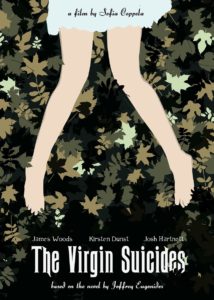
1999 is often cited as one of the greatest years for films. And it’s true. Among the most enduring of the immortal masterpieces released that year is Sofia Coppola’s feature debut. It’s magic. Just as hypnotizing and magnetic now as it was twenty-one years ago. Brilliant performances. A vibe and aesthetic that immediately centered Coppola as the voice of a new generation of filmmakers. Tender, compassionate, dreamy like a perfect pop song. If you haven’t seen it or haven’t seen it in a while, it’s a film that’s aged really well (unlike some of its ’99 counterparts). Many directors have tried to rip off Coppola’s style and flubbed it badly. Also very much worth watching (it’s not part of the TCM lineup but is available on the Criterion Channel): Lick the Star, the stunning 16mm short film Coppola made the same year that she began work on The Virgin Suicides.
We Need to Talk About Kevin. 2011. Prime Video, Kanopy, TCM.
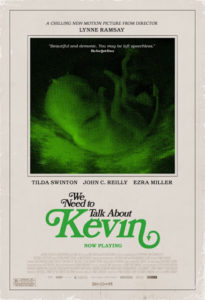
Scottish director Lynne Ramsay is one of my ten favorite living filmmakers. I love everything she’s made: her debut Ratcatcher; the transcendent Morvern Callar, one of my top five films of the 2000s; We Need to Talk About Kevin, from 2011; You Were Never Really Here, one of my top five films of the 2010s; and her several early shorts, especially Gasman. I often wish she were more prolific, but I’m very thankful for the work that we do have. Truly astounding stuff. We Need to Talk About Kevin might not be the best place to start. It’s jarring, unsettling. Then again, all of her work is jarring and unsettling. Ramsay is a master at showing the edges of trauma, the aftereffects and ripples. To me, this film—which centers on a school massacre—is among the most haunting and effective horror films of the century. The best horror brings dread and unease. Ramsay is so good at not showing the worst stuff, instead letting the unease suffuse the world of the story. The cinematography from Seamus McGarvey is gorgeous, and the film manages to be darkly funny at times despite its brutal subject matter. I’d also say there’s no working director who uses music as effectively as Ramsay—just a killer soundtrack. I’m still shaken by the use of a particular Washington Phillips song here.
And, in keeping with the theme of women making film, here are some picks that are not part of the TCM lineup I want to mention:
Valley Girl. 1983. Prime Video.
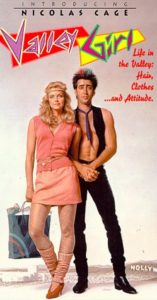 The TCM lineup is immense, with each filmmaker represented by only one film. Interestingly enough, Lost in Yonkers is the sole Martha Coolidge picture they’re showing. A strange choice that I don’t quite understand, as I’m much more partial to Angie, Rambling Rose, Not a Pretty Picture, and Real Genius. However—without a doubt—the film that Coolidge is most remembered and celebrated for, and the most obvious choice to represent her, is 1983’s Valley Girl. I rewatched it last week for the first time in quite a while, probably since the VHS days. It’s recently been added to Prime, and it also received a Collector’s Edition Blu-ray treatment from Shout! Factory in 2018—the version on Prime must be the HD transfer done for the Blu-ray because it looks achingly gorgeous. Deborah Foreman and Nicolas Cage are magnetic as hell. You can see why he went on to have the wild and genius career he’s had, but you’ll be left wondering why on earth Foreman had to fade away. A great soundtrack, a great time capsule of Los Angeles in the 1980s, a movie to disappear joyously into on a dark day.
The TCM lineup is immense, with each filmmaker represented by only one film. Interestingly enough, Lost in Yonkers is the sole Martha Coolidge picture they’re showing. A strange choice that I don’t quite understand, as I’m much more partial to Angie, Rambling Rose, Not a Pretty Picture, and Real Genius. However—without a doubt—the film that Coolidge is most remembered and celebrated for, and the most obvious choice to represent her, is 1983’s Valley Girl. I rewatched it last week for the first time in quite a while, probably since the VHS days. It’s recently been added to Prime, and it also received a Collector’s Edition Blu-ray treatment from Shout! Factory in 2018—the version on Prime must be the HD transfer done for the Blu-ray because it looks achingly gorgeous. Deborah Foreman and Nicolas Cage are magnetic as hell. You can see why he went on to have the wild and genius career he’s had, but you’ll be left wondering why on earth Foreman had to fade away. A great soundtrack, a great time capsule of Los Angeles in the 1980s, a movie to disappear joyously into on a dark day.
Silver Lode. 1954. Prime Video.
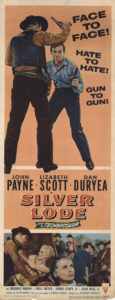
Last year, I went down a rabbit hole exploring Westerns written and/or directed by women. In short, there aren’t many. There are some from the silent era and the 1930s (Hollywood was more radical early on, before bending conservative) and several notable post-1980s examples (Maggie Greenwald’s The Ballad of Little Jo, Antonia Bird’s Ravenous, Kelly Reichardt’s Meek’s Cutoff, Susanna White’s Woman Walks Ahead, and Chloé Zhao’s The Rider), but I was interested in exploring women’s contributions in the classic Western period. Lina Wertmüller directed and co-wrote The Belle Starr Story in 1968, but Silver Lode is the most prominent example from the Western-drunk ’50s. Allan Dwan directs, with cinematography by the incredible John Alton. The script is by Karen DeWolf, who had her career ruined by the blacklist. (The villain in Silver Lode, played by Dan Duryea, is “McCarty.”) DeWolf had an interesting and varied career that included penning other Western B movies like Saga of Death Valley with Roy Rogers and Go West, Young Lady. Silver Lode, at a crisp eighty-one minutes, holds up really well and is one of those Westerns that feels never-endingly relevant. DeWolf’s script is tight and brilliant.
Pre-Code Joan Blondell. Criterion Channel. Featuring an intro by critic Imogen Sara Smith.
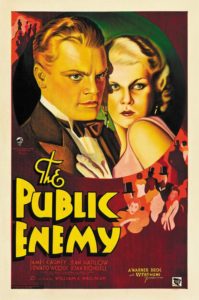
I love Joan Blondell so much. I got into gangster pictures young, and The Public Enemy was one of my first favorites. Blondell had a long and rich career, but this focus on her early work is the perfect place to dive in. It’s also a stellar introduction to the magic of the pre-Code era. There are thirteen Blondell films in all. Four of them are among my favorite pre-Codes: William A. Wellman’s The Public Enemy and Night Nurse; Mervyn LeRoy’s Three on a Match (I should spill way more ink on this amazing movie); and Gold Diggers of 1933. While only one of them is co-written by a woman (Grace Perkins, Night Nurse), this celebration of Blondell comes at the ideal time. She never wrote or directed herself, but she certainly broke down barriers. Oh man, such joy.
I’d be remiss if I didn’t mention the fact that Charlie Kaufman’s new film, I’m Thinking of Ending Things, will be on Netflix on September 4. As of this writing, I haven’t seen it yet, but it’s one of my most anticipated movies of the year. I also want to mention Gavin O’Connor’s The Way Back, new to HBO, an underdog sports movie featuring Ben Affleck—in his best performance ever (by a long shot)—as an alcoholic high school basketball coach. I was pretty blown away by it, which I didn’t expect. Finally, if you need some good laughs, the Criterion Channel’s also featuring five comedy masterpieces by the great Albert Brooks: Real Life, Modern Romance, Lost in America, Defending Your Life, and Mother.
William Boyle is the author of the novels Gravesend, The Lonely Witness, A Friend Is a Gift You Give Yourself, and City of Margins, and a story collection, Death Don’t Have No Mercy. His novella Everything Is Broken was published in Southwest Review Volume 104, numbers 1–4. His writing on film has appeared in Oxford American and CrimeReads. He used to have a blog about ’70s crime films called Goodbye Like a Bullet. His website is williammichaelboyle.com.
More Movies


